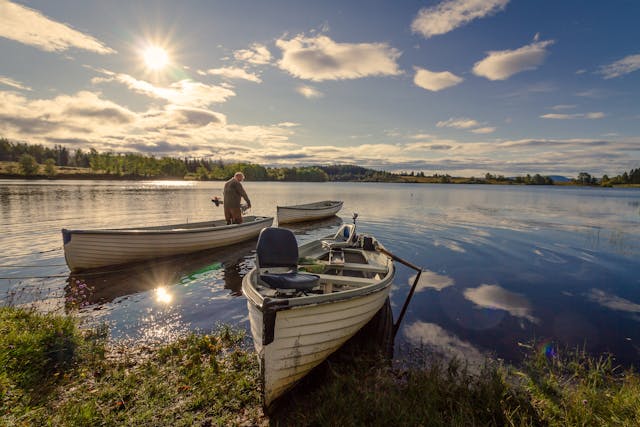
A fishing excursion is a great opportunity to relax, get back in touch with nature, and experience the excitement of making a catch. But when you include travel, equipment, and other fees, the costs may mount up rapidly. Thankfully, it is quite possible to have an unforgettable fishing experience without going over budget with a little preparation and ingenuity. There are numerous strategies to reduce expenses without compromising the caliber of your trip, regardless of your level of experience or desire to engage in this soothing activity on a budget. You can design a fun and economical fishing trip by concentrating on prudent budgeting, picking the ideal spot, and utilizing the resources at your disposal.
Select a Reasonably Priced Fishing Spot
Choosing the ideal spot is one of the most important aspects of organizing a fishing trip on a tight budget. Consider nearby fishing locations that provide great chances without the additional travel expenses, as opposed to long trips to upscale fishing resorts or far-off places that necessitate costly flights and lodging. Access to many lakes, rivers, and coastal areas is free or inexpensive, and some offer permit-free fishing. Look into public piers, state parks, and community fishing locations where you can fish for free or very inexpensively. Since camping is frequently far less expensive than hotels or lodges, if you would like a longer trip, seek campgrounds close to well-known fishing locations. Your overall costs can be greatly decreased by picking a location that is convenient to get to and has free or reasonably priced fishing access.
Reduce the Cost of Equipment and Gear
Although fishing equipment can be costly, there are several methods to save money without sacrificing the quality of your trip. Instead of buying new gear if you are an occasional angler, think about borrowing it from friends or family. As an alternative, you can save a significant amount of money by purchasing used fishing rods, reels, and tackle from local bait stores or internet markets. Additionally, a lot of stores provide rental services, which let you use top-notch equipment at a much lower price. Another excellent choice is to stock up on essentials during end-of-season bargains or search for discounts at outdoor merchants. Additionally, since tourist destinations frequently jack up costs greatly, bringing your bait and tackle rather than purchasing them on-site will help you save money. Choosing your equipment wisely can guarantee that you have all you need for a fun trip without going over budget.
Examine Low-Cost Fishing Techniques
Your budget may also be impacted by the kind of fishing you select. Try shore fishing, pier fishing, or freshwater fishing instead of costly deep-sea fishing charters. These activities typically cost little to nothing more than a fishing license. If you are interested in venturing further into the water, appealing fishing boat hire solutions are cost-effective alternatives to guided fishing tours. You can visit several fishing locations without having to pay the exorbitant prices of private charters by renting a boat for a few hours. A lot of marinas and nearby establishments provide reasonably priced rental choices, particularly if you make reservations in advance or divide the price with companions. Additionally, think about employing straightforward and efficient fishing methods that call for little equipment, such as fly fishing or using live bait rather than artificial lures. You can still have a successful fishing trip without incurring needless costs by modifying your fishing techniques to suit your spending limit.
Benefit from Free or Cheap Fishing Days
Anglers can fish for free on certain days or weekends in several states and nations without having to buy a license. These days are great for enjoying a fishing expedition without having to pay additional license fees. To find out whether and when these activities take place in your area, contact the fish and wildlife department in your community. On some days, fishing enthusiasts can also get free admission or special discounts at some parks and recreational places. Joining a neighborhood fishing club or community group can also provide you access to exclusive fishing locations, pooled equipment, and money-saving advice from seasoned fishermen. By taking advantage of these free or heavily discounted chances, you can still have a fun and fulfilling fishing trip at a lower cost.
Prepare Ahead of Time and Bring Food from Home
Although lodging and food might be among the most expensive aspects of a fishing trip, they are also areas where careful preparation can result in significant cost savings. Make your own meals and take them with you rather than eating out or buying pricey convenience shop snacks. You may stay motivated without having to pay more for eating out by packing sandwiches, granola bars, and other portable foods. Cooking over a campfire or portable stove, if permitted by your destination, can further reduce expenses while enhancing the experience. Additionally, you can avoid paying the highest rates for lodging and permits by scheduling your vacation during the off-season. You may get the most out of your fishing trip at the most affordable price by researching local fishing restrictions, fish migration seasons, and weather trends in advance.
With the correct techniques, organizing a productive fishing trip on a tight budget is completely feasible. You may have a memorable fishing trip without going over budget if you pick a reasonably priced location, choose your equipment wisely, and think about economical fishing techniques. Simple yet efficient methods to save costs while optimizing the experience of your trip include renting equipment, splitting expenses with companions, and packing your own meals. You can make a fishing trip into a fun and economical activity that won’t break the bank with a little planning and imagination. Making the most of the resources available while controlling costs is the secret to a vacation that is affordable, whether you are fishing from a local pier, a boat, or the shore.














